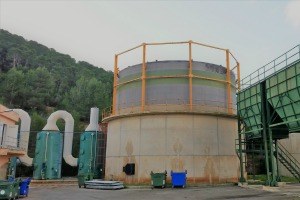Calvià 2000 takes advantage of the biogas generated by the water treatment plant to optimize the process and produce heating and hot water. It reduces bad odour and economic and environmental costs.

Calvià, 2nd January 2017
Calvià 2000 takes advantage of the biogas generated by the water treatment plant to optimize the process and produce heating and hot water.
-It reduces bad odour and economic and environmental costs.
Sustainability is a strategic objective for the municipal company Calvià 2000, immersed in a process of strategic rethinking that will be completed in January 2017. This objective means not only to carry out its operations in a more environmentally friendly way, but also to become an example of environmental management in the municipality.
Within this line of action, Calvià 2000 already carries out certain activities aimed at minimizing its energy consumption, especially in the area of the integral water cycle. One of the most relevant is the use of biogas as fuel for boilers.
In the case of the Santa Ponça sewage treatment plant (EDAR), this activity consists of taking advantage of the biogas generated in the process of purifying the waste water to maintain the optimum temperature in the process of "digestion", and also to warm the facilities and provide hot water to the changing rooms in the treatment plant.
Biogas is a combustible gas that is created in the treatment of sludge, as a result of the degradation of the organic matter present in them in absence of oxygen (anaerobic digestion). The digestion process is carried out by methanogenic bacteria, which release gases when degrading organic matter, mainly methane.
This biogas is accumulated in a tank called a gasometer, to be used later as fuel in the boilers of the Santa Ponça WWTP. This tank has a floating hood that goes up or down depending on the amount of gas stored. The system has a torch, which is only put into operation to burn excess gas when production exceeds demand.
The combustion of biogas represents a sustainable energy source, reduces the environmental impact (odours) and there are no emissions of greenhouse gases. As a result, the economic and social costs of the purification process is reduced.




